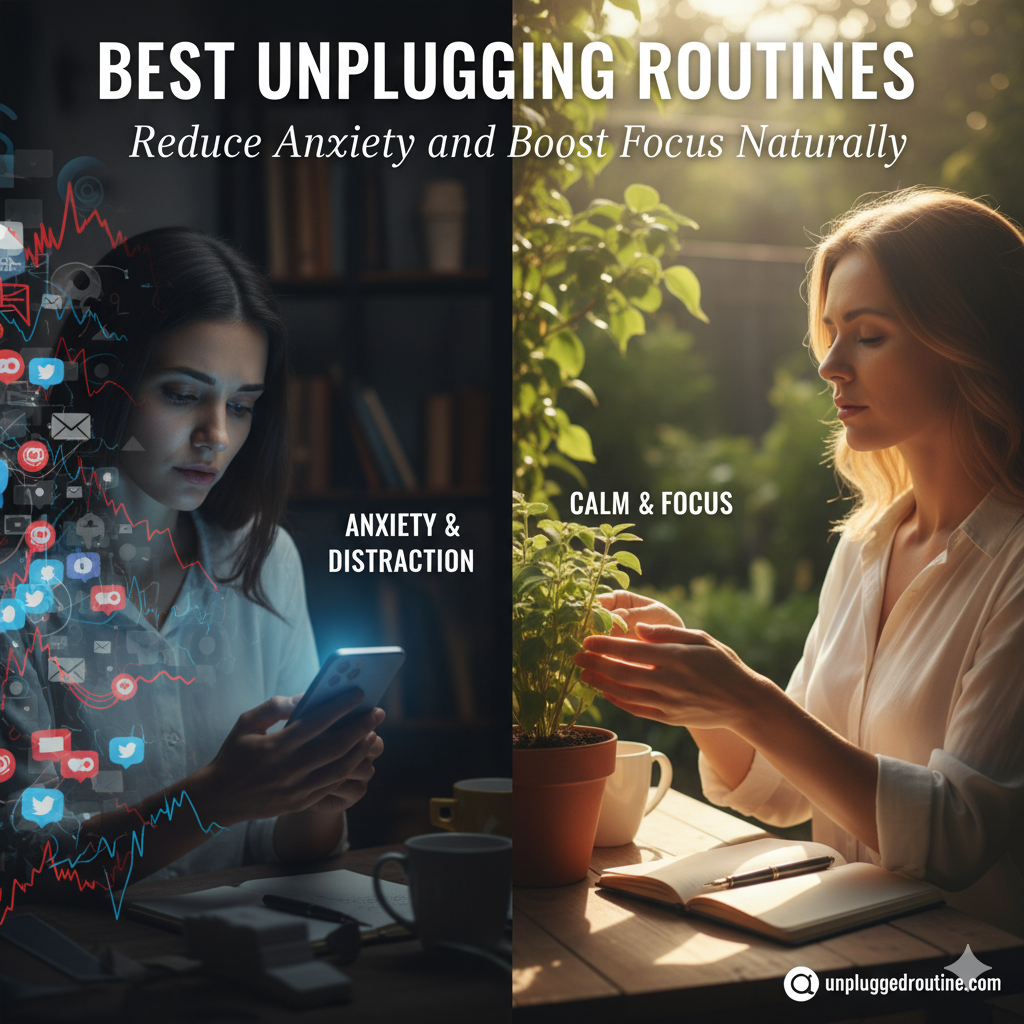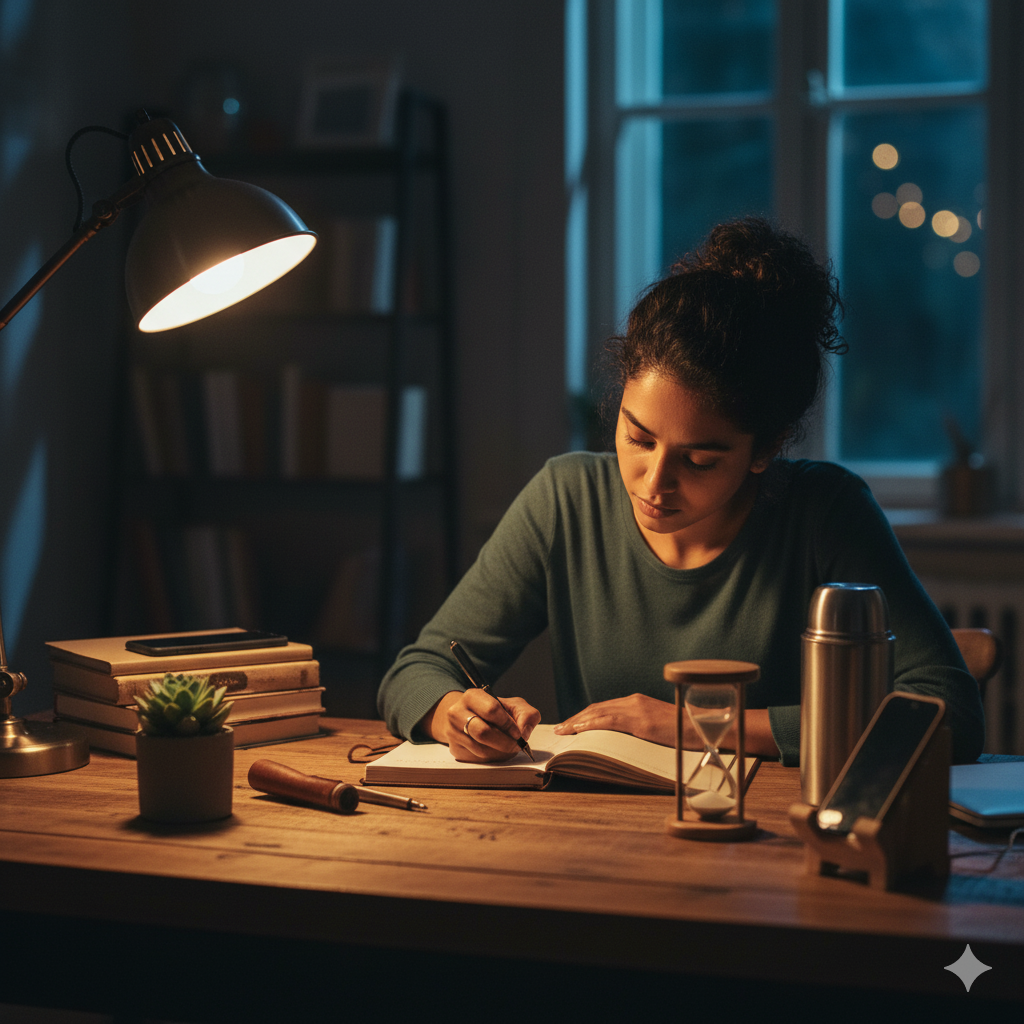Feeling the constant hum of worry? Struggling to concentrate on a single task without your mind wandering or your phone buzzing? You’re not alone.
In our always-connected world, anxiety is at an all-time high, and our ability to focus feels like a superpower few possess. The endless notifications, the pressure to “be online,” and the constant influx of information are silently eroding our peace of mind and hijacking our attention.
But what if there was a simple, natural antidote?
Imagine a life where you feel calmer, your thoughts are clearer, and you can dive deep into tasks without constant distraction. This isn’t a fantasy; it’s the profound power of unplugging routines.
This isn’t about abandoning technology forever. It’s about consciously stepping away from the digital noise to cultivate inner peace and sharpen your mental edge. Think of it as hitting the reset button on your nervous system and your attention span.
Ready to reclaim your calm and supercharge your focus?
This ultimate guide will introduce you to the best unplugging routines to reduce anxiety and boost focus naturally, giving you actionable steps to transform your daily life. Let’s disconnect to reconnect with what truly matters!

The Hidden Cost of Constant Connectivity: Why We’re Anxious and Distracted
Before we dive into the solutions, let’s briefly understand the problem. Our brains are magnificent, but they weren’t designed for the relentless pace of the digital age. Here’s how constant connection contributes to anxiety and lack of focus:
- Notification Overload: Each ping pulls your attention, interrupting your flow and creating a constant state of alertness, leading to anxiety.
- Dopamine Addiction: Social media likes and new emails provide quick dopamine hits, making your brain crave more, creating an addictive loop that hinders focus.
- Comparison Culture: Seeing curated online lives can trigger feelings of inadequacy and social anxiety.
- Blue Light Disruption: Screens before bed interfere with melatonin production, leading to poor sleep, which directly impacts mood and concentration.
- Cognitive Overload: Too much information swamps your brain, making it harder to process, retain, and recall information.
- Fear of Missing Out (FOMO): The underlying anxiety that something exciting is happening online without you.
Recognizing these impacts is the first step toward understanding the profound benefits of intentional unplugging. It’s not just about disconnecting; it’s about healing your mind.
Pre-Routine Prep: Setting the Stage for Success
To truly benefit from these routines, a little groundwork goes a long way. Think of these as your launchpad to a calmer, more focused you.
Hook Step 1: Identify Your Digital Triggers
What digital habits trigger your anxiety or distraction the most? Is it endless social media scrolling, checking work emails after hours, or constantly reading news alerts? Pinpoint your top 1-2 triggers. Knowing them helps you target your unplugging efforts effectively.
Hook Step 2: Set Clear Intentions
What specific outcomes are you hoping for? “I want to feel less anxious before bed” or “I want to focus for 30 uninterrupted minutes on my project.” Writing down your intentions makes your goals tangible and motivating.
Hook Step 3: Curate Your Environment
Remove tempting devices from key areas, especially your bedroom. Create a “charging station” outside your sleep space. Stock up on analog alternatives like books, journals, art supplies, or board games.
Hook Step 4: Communicate Your Boundaries
Let close family, friends, and essential colleagues know you’ll be less digitally available during certain times. “I’ll be offline from 8 PM onwards” helps manage expectations and reduces internal pressure.
Hook Step 5: Embrace Imperfection
This isn’t about being perfect; it’s about progress. You might slip up, and that’s okay! The goal is to build sustainable habits, not achieve instant digital monasticism. Be kind to yourself through the process.
The Best Unplugging Routines to Reduce Anxiety and Boost Focus Naturally
Here are powerful, actionable routines you can integrate into your day to calm your mind and sharpen your attention. Mix and match to find what works best for you!
1. The Mindful Morning Unplug (Anxiety Reducer, Focus Booster)
Why it works: How you start your day sets the tone. Immediately grabbing your phone floods your brain with external demands before you’ve even connected with yourself.
- Hook Step: For the first 30-60 minutes after waking, do NOT touch your phone. Place it on silent, outside your bedroom if possible.
- Routine Action: Use this time for quiet reflection, meditation, gentle stretching, journaling, or a tech-free breakfast.
- Pro-Tip: If you need an alarm, use an old-school alarm clock. This removes the temptation to scroll the moment you open your eyes.
- Benefit: Allows your brain to transition gently from sleep, reduces cortisol spikes from immediate external pressure, and sets a calm, intentional foundation for your day.
2. The Notification Ninja Protocol (Anxiety Reducer, Focus Booster)
Why it works: Every notification is an interruption. Interruptions break focus and keep your nervous system on high alert.
- Hook Step: Turn off all non-essential notifications on your phone, tablet, and computer. Yes, all of them.
- Routine Action: For apps you truly need, customize settings to only allow critical alerts (e.g., direct messages from a specific person, but not all group chat pings).
- Pro-Tip: Schedule “check-in” times for emails and social media (e.g., 10 AM, 2 PM, 5 PM). Outside these times, resist the urge.
- Benefit: Drastically reduces mental clutter, allows for sustained periods of deep work, and lowers the background hum of anxiety caused by constant digital demands.
3. The Digital Sunset (Anxiety Reducer, Sleep Enhancer)
Why it works: Blue light from screens suppresses melatonin, the hormone that helps you sleep. Engaging with stimulating content before bed also keeps your mind racing.
- Hook Step: Implement a “Digital Sunset” 60-90 minutes before bedtime. All screens (phone, tablet, computer, TV) go off.
- Routine Action: Replace screen time with calming activities: reading a physical book, listening to soothing music, taking a warm bath, journaling, or having a quiet conversation.
- Pro-Tip: Create a dedicated “bedtime ritual” that signals to your brain it’s time to wind down.
- Benefit: Promotes natural melatonin production, reduces mental stimulation, and significantly improves sleep quality, leading to reduced daytime anxiety and better focus.
4. The Analog Anchor (Focus Booster, Anxiety Reducer)
Why it works: Re-engaging with the physical world grounds us, stimulates different parts of the brain, and pulls us away from the abstract digital realm.
- Hook Step: Dedicate 15-30 minutes daily to a completely analog activity.
- Routine Action: This could be anything from sketching, knitting, gardening, playing a musical instrument, solving a physical puzzle, or cooking from scratch without relying on a screen for instructions.
- Pro-Tip: Keep your chosen analog “anchor” readily available and visible to make it an easy choice when you feel restless.
- Benefit: Enhances creativity, improves fine motor skills, provides a tangible sense of accomplishment, and offers a powerful antidote to digital fatigue, boosting focus on real-world tasks.
5. Nature Nurture Breaks (Anxiety Reducer, Focus Booster)
Why it works: Spending time in nature has scientifically proven benefits for reducing stress hormones and improving cognitive function.
- Hook Step: Take 10-20 minutes daily to immerse yourself in a natural environment – no phone, no podcasts.
- Routine Action: Go for a walk in a park, sit in your garden, or simply observe the trees and sky from a window. Engage your senses: what do you see, hear, smell?
- Pro-Tip: Combine this with walking. Even a short walk helps clear your head and re-energize your brain.
- Benefit: Lowers cortisol levels, reduces rumination, restores directed attention, and provides a powerful sense of perspective, naturally reducing anxiety and improving concentration.
6. The Single-Tasking Sprint (Focus Booster, Anxiety Reducer)
Why it works: Multitasking is a myth; our brains simply switch rapidly between tasks, leading to errors and mental exhaustion. Single-tasking trains your focus.
- Hook Step: Choose one important task and commit to working on it for a set period (e.g., 25-45 minutes) without any digital distractions.
- Routine Action: Close all unnecessary tabs, put your phone in another room, and fully immerse yourself in that single task. Use a timer if it helps.
- Pro-Tip: Start small. Even 15 minutes of uninterrupted focus can feel like a win and build your “focus muscle.”
- Benefit: Dramatically increases productivity, improves the quality of your work, reduces feelings of overwhelm, and builds confidence in your ability to concentrate, thereby reducing performance-related anxiety.

7. The Weekly Digital Sabbath (Anxiety Reducer, Holistic Reset)
Why it works: A longer, intentional break allows for a deeper reset, breaking habitual digital patterns and fostering profound rest.
- Hook Step: Designate one full day per week (e.g., Sunday) as your “Digital Sabbath,” where you commit to minimal or no screen time for leisure.
- Routine Action: Plan screen-free activities for this day: explore a new town, visit a museum, spend time with loved ones, embark on a cooking project, read extensively, or engage in outdoor adventures.
- Pro-Tip: Let key people know in advance that you’ll be offline. Have a plan for emergencies if needed (e.g., using a landline).
- Benefit: Provides a holistic mental and emotional reset, strengthens real-world relationships, encourages new experiences, and significantly reduces cumulative anxiety from constant digital demands. This is one of the most powerful unplugging routines to reduce anxiety and boost focus naturally.
Troubleshooting Your Unplugging Journey
It’s natural to encounter challenges when breaking old habits. Here’s how to navigate common roadblocks:
- “I feel bored/restless!”: This is a good sign! It means your brain is detoxing. Revisit your list of analog activities. Boredom is the birthplace of creativity.
- “What if there’s an emergency?”: Have a designated “emergency contact” plan (e.g., specific family members have a landline number, or you’ll check texts from only them at a set time).
- “I need my phone for X, Y, Z!”: Distinguish between true necessity and habit. Could you use a physical map? A cookbook? An actual watch? Often, alternatives exist.
- “I keep slipping up!”: Don’t self-criticize. Simply acknowledge the slip and gently redirect yourself. Every moment is a new chance to choose connection over distraction.
- “My friends/family don’t understand”: Explain your “why.” “I’m doing this for my mental health to feel less anxious.” Most people will respect that.
Making Unplugging a Lifestyle, Not Just a Trend
The true power of these routines isn’t in a one-off detox, but in integrating them into a sustainable, balanced lifestyle. Think of it as cultivating a mindful relationship with technology, where you are in control, not the other way around
By consistently applying the best unplugging routines to reduce anxiety and boost focus naturally, you’ll build resilience against digital overwhelm and cultivate a deeper, more present way of living.
Reclaim Your Peace, Unleash Your Potential
The digital age offers incredible benefits, but it also presents a unique challenge to our mental well-being. If you’ve been feeling anxious, scattered, or perpetually drained, it’s a clear signal: your brain is craving a break.
Embracing unplugging routines isn’t about deprivation; it’s about liberation. It’s about giving your nervous system the rest it deserves, allowing your mind to calm, and rediscovering your natural capacity for deep focus and genuine presence. You have the power to step off the digital hamster wheel and craft a life that feels more balanced, peaceful, and productive.
Start small, be consistent, and observe the profound shifts in your anxiety levels and your ability to concentrate. Your calmer mind and sharper focus are waiting for you, just beyond the screen.
Which of these unplugging routines will you try first to reduce anxiety and boost your focus? Share your commitment in the comments below! Let’s build a community of conscious disconnectors!